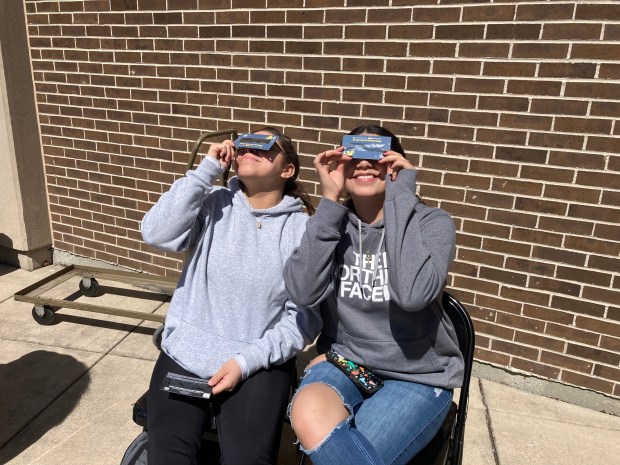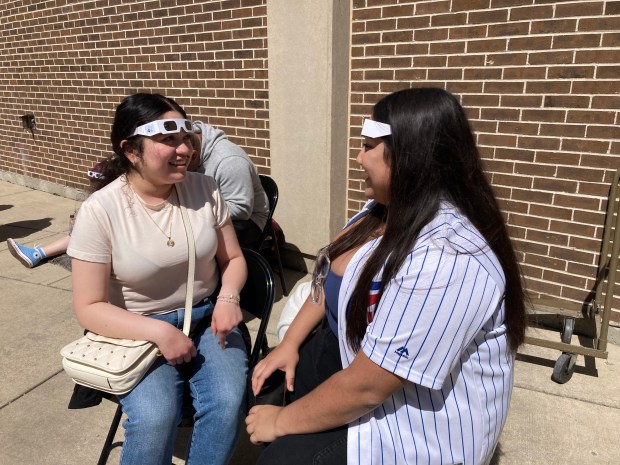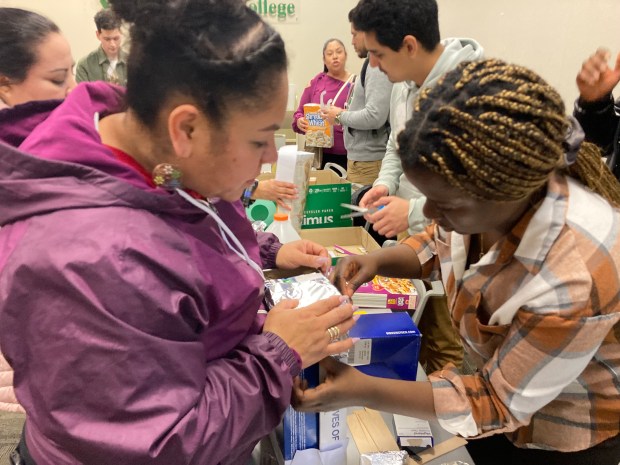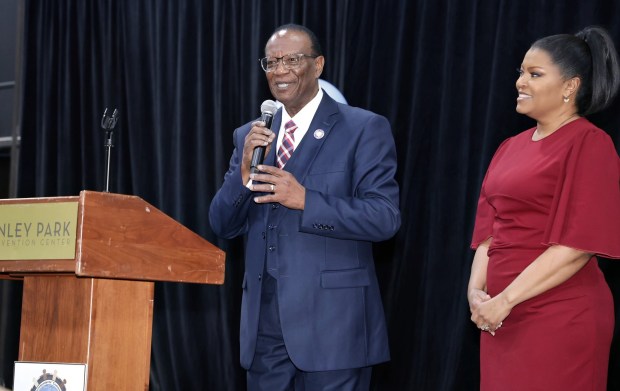Kyra Simmons, 11, stood in the Prairie State College Scholar’s Garden Monday looking through a handmade pinhole projector.
Kyra Simmons said she was most excited to see the moon cover the sun. Kim Simmons, her mother, said she and her friend, Kelly McClure, both brought their fifth grade daughters to the Prairie State College viewing event to experience the eclipse and learn about science.
“We’re living science outside the classroom,” Kim Simmons said. “It’s another way for them to bring science into their life in a real way.”
A total eclipse occurs when the moon passes between the sun and the Earth, completely blocking the sun, according to NASA. People who observed the eclipse from outside the path of totality saw a partial eclipse, where the moon covers most of the sun.
While Chicago and its suburbs weren’t in the path of totality — where the moon completely covers the sun — the town of Carbondale in southern Illinois experienced the total eclipse at 1:59 p.m., with a partial eclipse beginning at 12:42 p.m., according to NASA.
The Prairie State College Library, which is also a public library, partnered with the college’s Natural Sciences Department and STEM Club to host the Mondy eclipse viewing event, said Dawn Sterning, library services manager.
“Thankfully the weather cooperated,” Sterning said.
The Adler Planetarium donated about 300 pairs of the special glasses required to look directly at the sun, Sterning said, which were handed out to attendees.
Librarian Russell Guldin gave glasses to people as they came into the college’s Scholar’s Garden. He showed people how to properly wear them and warned them about the dangers of looking at an eclipse with a naked eye.
“If you look at the sun when it’s fully eclipsed, the amount of time it takes for you to get a little sun spot when looking at the sun straight ahead will probably give you a permanent sun spot on your eye forever,” Guldin told one group before handing them some glasses.

The STEM Club students helped event attendees make pinhole projectors using show ]and cereal boxes, said Natalie McGathey, a math professor and STEM club advisor.
When using the pinhole projectors, people stand with their back to the sun to safely view the eclipse shadow through a hole in the card, McGathey said.
“It’s almost like watching a moving picture of the eclipse happening because you have the sun’s concentrated rays through the hole of the projector,” McGathey said.
McGathey said experts use dynamics, a branch of mathematics, to determine the exact time of the peak of the eclipse and the exact path of totality.
“We’re all excited, and it’s a way for people to learn about STEM,” McGathey said.

Betzaida Ortiz and Emily Martinez, both students, said they came to see the eclipse because it is the first one they would experience as adults.
“Since we never seen one before, I’m excited to see it,” Martinez said.
Ortiz said she appreciated receiving the solar eclipse glasses because she’s heard about the dangers of looking directly at the sun during the eclipse.
“I’m a little scared. I’m just taking care of my eyes,” Ortiz said.
Guadalupe Rodriguez and Juliassa Acosta, both students, said they were excited to see the eclipse and the darkness as a result.
“We think the moon affects everything about you, so we’re excited to see it,” Acosta said.
akukulka@chicagotribune.com





